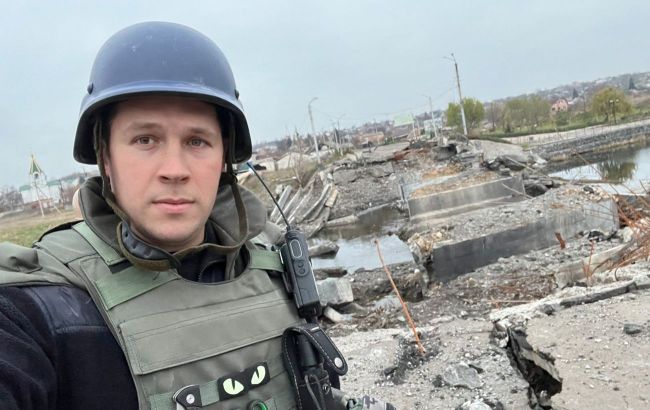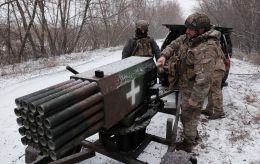Unarmed heroes who kept Bakhmut from enemy fire: SES employee story
 Photo: Arthur Spitsyn (photo from his own archive)
Photo: Arthur Spitsyn (photo from his own archive)
Bakhmut became a real challenge not only for the military and civilians but also for the rescuers. Risking their lives, they tried to save others. Deputy Chief of the Bakhmut District Department of the State Emergency Service of Ukraine (SES) in Donetsk region, Chief of the Department of Emergency Situations Prevention, Arthur Spitsyn, shared the details with RBC-Ukraine.
When a shell hits a house and it cracks at the seams, the only ones the residents can rely on are the rescuers. Despite the threat of further strikes, they spread out like ants in the attacked building to save people trapped under the rubble.
With each passing day and the Russian troops approaching Bakhmut, life in the city became a survival game. When the city was engulfed in flames, the Bakhmut employees of the State Emergency Service (SES) joined the battle against the fire.
Chief of the Department of Emergency Situations Prevention of the Bakhmut District Department, Arthur Spitsyn, spoke to RBC-Ukraine about the war, working conditions, and losses. Here are his words.
At the start of full-scale war
For me, February 24th was one of the most challenging days in my life. Because I couldn't believe that in the 21st century, a full-scale war could happen. I couldn't believe that the citizens of a neighboring country were capable of such actions. What kind of motivation must a person have to go to someone else's land with tanks, cannons, and aviation and bomb the civilian population?
As the State Emergency Service, we have work regulations: what we should have with us and action algorithms for various situations, including firefighting. We should be ready to gather and perform our tasks at any moment. But did we know that we would have to work in such conditions?
Life in Bakhmut before the conflict
Not far from Bakhmut lies a small town in the Luhansk region called Popasna. I witnessed people being evacuated from there in March and April. They were happy because, at that time, our city was still intact and peaceful, with functioning fountains and shops. I overheard a conversation between two older women:
"Look at how happy these people are. The whole city is intact. They have mobile communication. Look at these people, they are living their lives, unlike in Popasna."
At that time, the people of Bakhmut had no idea what awaited them. They had no clue that Russian aviation, missiles, and artillery would soon turn their city unrecognizable.
On the onset of hostilities
The occupiers approached the outskirts of Bakhmut sometime in the summer. More rockets were fired, and the first Grad missile launches occurred, claiming the lives of innocent civilians. Rockets landed on civilian buildings, and I watched as my city was destroyed: schools, factories, and residential buildings all reduced to rubble. And with each passing day, the destruction grew.
There were instances when these rockets hit 5- or 9-story buildings inhabited by civilians only. There were also cases where missiles hit intersections, damaging water and communication networks.
The municipal services did their best to maintain some semblance of normalcy for the people, working tirelessly till it was possible. As rescuers, we dealt with the aftermath of shelling, including extinguishing fires.
One incident stands out in my memory when a fire broke out near the "Zabakhmutka" district. The flames engulfed 7-8 floors. Our team fought the fire, but the city's water supply was cut off at that time. We had to travel to open reservoirs, fill tanks with water, and return to the fire.
As the tanker was nearing empty and heading to the refueling station, I witnessed people desperately scrambling for the remaining water. We poured water into their buckets. It struck me as a catastrophe that people had to fight for water sourced from a nearby pond.
Rescue operations
Since the start of the full-scale war, Bakhmut's State Emergency Service workers have saved 24 individuals, while 71 bodies have been recovered from the rubble. We assisted 213 people affected by artillery strikes or rocket attacks, with 205 cases registered last year. In 2022, the rescuers extinguished 836 fires, and this year, 170 fires in the Bakhmut district alone.
When our colleagues work in a combat zone, they receive additional compensation for participating in rescue operations. However, there is nothing more valuable than saving lives. We strive to do everything within our power.
About Russian citizens
I never had the opportunity to communicate with Russian soldiers, but there were some funny incidents. Once, we evacuated two older people who took an extremely long time to prepare for evacuation. They chased after their dog, tidying up as if they were planning to return the next day. Despite the intense shelling, they paid no mind to the danger.
We evacuated them to Kostiantynivka. I needed their information for official purposes, so I asked for their documents. They provided residence permits, which indicated their Russian citizenship. I realized that on that day, we risked our lives to save Russian citizens from Russian citizens. It struck me as rather amusing.
About Chasiv Yar
Today, Chasiv Yar resembles Bakhmut. The city has been destroyed, and Russian tactics are replicated. The city is being destroyed by artillery and aerial missiles. The risks are just as high as those in Bakhmut during the spring. There are numerous airstrikes and extensive destruction of infrastructure and buildings.
There was a particular incident when an aerial missile struck a five-story building, destroying a dormitory section. Many people lost their lives. We spent several days clearing the rubble. We managed to rescue some people, but there were more casualties.
The situation in Chasiv Yar is dire, devoid of civilization.
Working conditions
Regarding working conditions, there was an instance when we traveled on a humanitarian mission to provide civilians with drinking water and food supplies. On our return, we came under enemy artillery fire. Two vehicles were damaged, but fortunately, we stayed unharmed. This story serves as an example of the challenging conditions we face while working.
When our team extinguished fires, there was no guarantee that the following attacks would not occur. Such instances have been frequent, regardless of whether we work during daylight or darkness. There is no chance of escaping harm.
Only some people had body armor in the early days of the war. The minimum necessary for performing our tasks was provided. However, we are now adequately equipped, having everything we need to work under these conditions.
About the fear
My greatest fear is that we will respond to a call for help and cannot provide assistance, evacuate, or reach someone under rubble in time. The conditions are incredibly challenging, especially when extinguishing fires. When it comes to fire, every second is crucial. That is why I worry we might be unable to help in time.
It is heart-wrenching to witness that in cities experiencing active fighting, children and their parents choose not to evacuate. I wonder about the future of these children and how they will cope with the hardships of this war.
We appeared to be under fire while children were nearby. I have seen the fear in their eyes. It hurts me to witness their panic, and I can not understand their parents' reasoning. Whenever we have the opportunity to speak with them, we explain that their presence will not save their property but only endangers their children.
SES losses
Since the beginning of the full-scale war up until today, we have lost one person, Illia Shamilievych, who posthumously received the award of "Hero of Ukraine." While performing his duties, he died during search and rescue operations in a multi-story building. When an attack occurred, the team scattered in different directions, but Illia was in the most vulnerable position and could not avoid the hit. He died on the spot. Additionally, six individuals got injuries of various degrees, ranging from concussion to blast-related traumas.
When we became rescuers, we understood the risks involved. Working under the conditions of armed conflict has become even more challenging, and the probability of not returning after each call is higher. Nevertheless, we are here, doing our job.
***
Every day, thousands of rescuers work amid armed conflict, risking their lives to save civilians, while the Russian army, claiming "liberation," continues to destroy entire cities. The stronghold of Bakhmut endures partly due to the efforts of the emergency services, who fought fires, cleared rubble, and assisted civilians until the very last day.

